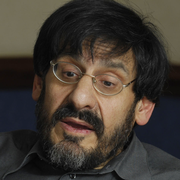
ELECTIONS are often not about what is fair, but about what is seen to be fair. Demands that Independent Electoral Commission of South Africa (IEC) chairwoman Pansy Tlakula step down seem like an attempt by smaller parties to hold the election to ransom. To an extent, they are. But, despite that, they may need to be taken seriously to protect the election’s credibility.
Demands that Tlakula should go because of questions about her financial management are opposed by the African National Congress (ANC) and have not been endorsed by the Democratic Alliance (DA) and Freedom Front Plus. This means they are supported by parties that probably speak for one-fifth of the electorate at most.
One party leader, the United Democratic Movement’s Bantu Holomisa, has claimed publicly that the allegations show that the ANC will rig the election. To say that this is irresponsible is a huge understatement. There is no logical connection between Tlakula’s financial management and whether the election is free and fair: Holomisa provides no evidence of fraud. The only serious allegation against the IEC was raised by candidates in Tlokwe last year, who accused officials of vote rigging. The problem was quickly highlighted and there is no evidence that it has occurred elsewhere.
The Tlokwe incident came to light quickly because parties enjoy access to the IEC. If they are cheated, they are likely to know about it quickly and complain loudly.
In some countries, elections are run by a public service whose neutrality is accepted by the parties. Parties can observe voting and counting, but have no say in how they are run. Here, the IEC must establish political party liaison committees so that parties can monitor and influence the way in which elections are run. Given the divisions in our society, this is the right approach: as long as it persists, our elections are likely to be protected.
So, despite the noise from the smaller parties, the election is likely to be conducted fairly if Tlakula stays. But that is not the only consideration: whether parties have confidence in an election is more important than whether it can be shown "objectively" to have been fair.
In 1994, the IEC asked its information analysis department (headed by this columnist) to develop a test of whether an election was free and fair. Our research showed that there was only one test — whether the losers accepted the results (winners obviously need no persuading).
We assumed that if ballot boxes were stuffed or votes miscounted, elections were not fair. But we knew that even if these basics were observed, elections might still be open to challenge: in those cases, the key was to make sure that all the parties (or at least a critical mass) accepted that the process was free and fair and would therefore accept the results. The commission’s priority was not to produce the perfect election — it was to work with the parties: if parties are included in the process and agree it is fair, they obviously have no grounds to complain if they lose.
This view was vindicated by the outcome. The 1994 poll was no great technical success: just about everything that could go wrong, did. But the result was accepted by all the parties because they negotiated it. All complained about the process; they traded and came up with a result with which all could live. Thankfully, that never happened again but it confirms that credible elections are essentially about whether the parties are willing to accept the process.
This places Tlakula’s situation in a new light. The parties that want her out may have no grounds for claiming that the election is rigged but, if she stays, they might use this to claim the election was unfair. As there is a cloud over her head, many of their supporters may believe this. If she steps down, she will disarm parties that want to use spurious vote fraud claims to claim they were cheated.
A credible election is not one that four-fifths of voters consider fair — it is one that all or almost all do. Whether or not the claims against Tlakula are fair, an electoral commission chairwoman who has been rejected by eight parties is not able to do what the constitution requires her to do — run a credible election. The importance of credibility to elections may explain why Tlakula is under pressure within the IEC. Deputy chairman Terry Tselane has said the controversy is making it harder to run the election and has urged her to defuse it — reports claim IEC workers are threatening to strike if she does not step down. Even if they are only a minority, this suggests that part of the IEC feels that Tlakula’s problem is making it harder to run a credible election.
One of the key strengths of our democracy has been the credibility of our elections: this is a precious asset that we need to protect. That is why claims that the election will be rigged if Tlakula stays are breathtakingly irresponsible. But it is also why she should step aside to protect the credibility of the poll.
By Steven Friedman
Friedman is director of the Centre for the Study of Democracy.
